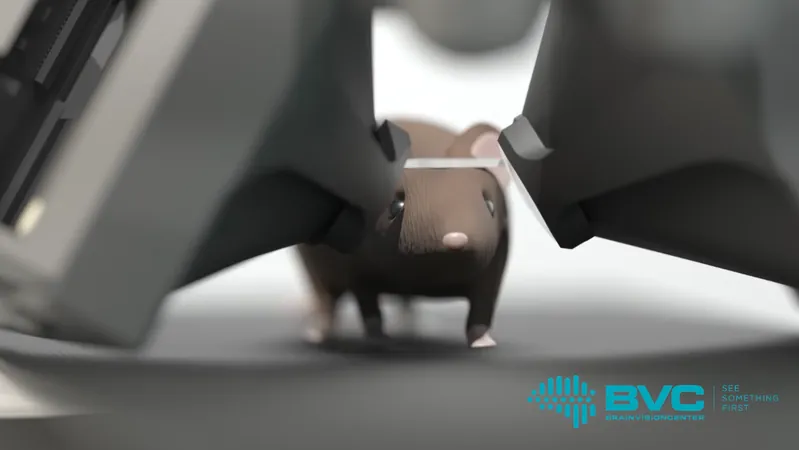
Breakthrough Hungarian VR System Revolutionizes Mouse Brain Research and Vision Restoration!
2024-12-17
Author: Mei
Introduction
A pioneering virtual reality (VR) system named Moculus has been developed by the BrainVisionCenter Research Institute and Competence Centre (BVC) in partnership with the HUN-REN Institute of Experimental Medicine (HUN-REN KOKI), marking a monumental stride in brain research. This revolutionary technology is tailored specifically for mice, setting a new standard in the examination of brain function and the advancement of brain-computer interfaces aimed at restoring vision.
Technology Overview
Moculus is not just any VR system; it provides a hyper-realistic simulation of natural vision, unlocking new pathways for learning that are up to one hundred times more efficient than past technologies. Spearheaded by researchers Linda Judák, Gergely Szalay, Gergely Dobos, and Balázs Rózsa, this groundbreaking study was published in *Nature Methods* on December 12, and showcases the brain's adaptability, particularly within the visual cortex of mice during structured learning.
Historical Context and Need for Innovation
Historically, VR systems utilized two-dimensional projections for studying rodent brain function, but recent findings indicate that these methods faltered in effectively replicating the visual experience for mice. Unlike humans, who can interpret flat images into a three-dimensional context, mice require a tailored visual environment to experience the world in three dimensions. “The research demonstrated that mice only perceive their environment realistically when the virtual experience is specifically designed to suit their visual capabilities,” noted lead researcher Gergely Szalay from HUN-REN KOKI and BVC.
System Design and Functionality
The Moculus system is engineered with a sophisticated framework, including a specially designed treadmill to accurately track mouse movements, dual high-resolution screens, and an optical setup that offers an extensive field of view exceeding 180 degrees. This immersive environment allows mice to engage naturally with their surroundings, while researchers utilize advanced two-photon microscopy to monitor brain activity in real time. Linda Judák stated, “Rodents have remarkably sophisticated visual learning abilities. While older VR systems required 5 to 9 days for learning, Moculus enables mice to acquire new visual information in as little as 30 minutes.”
Significance of Findings
This enhanced learning speed, alongside the capacity to observe real-time brain activity at a cellular level, represents a significant leap in unraveling the neural mechanics that dictate learning and decision-making. The importance of these findings cannot be overstated, particularly in their potential applications for developing treatments focused on neurological disorders and vision impairments.
Future Implications
Balázs Rózsa, director of BVC and prominent figure at HUN-REN KOKI and Pázmány Péter University, emphasized the precision of the Moculus system: "It generates detailed spatial-temporal brain activity patterns that encode visual elements of the environment with unprecedented accuracy. This leads us closer to creating advanced 3D vision-restoration tools that can stimulate neurons with remarkable precision, resulting in next-level artificial vision interventions."
Conclusion
The launch of Moculus marks a pivotal achievement in BVC’s ongoing commitment to enhance therapeutic strategies for vision restoration. Rózsa affirmatively stated, “Since we established the BrainVisionCenter in late 2021, our focus has been on vision recovery and the development of necessary research tools. Moculus plays a critical role in accomplishing this mission, enabling us to test gene-based therapies more effectively than ever before.”
Market Position and Community Impact
With the absence of comparable tools in the market, the Moculus system is set to garner considerable attention from the neuroscience community, offering a robust platform for groundbreaking scientific inquiry and applied therapeutic innovations. Could this innovative tool lead to transformative treatments for those suffering from vision loss? The anticipation surrounding Moculus is palpable, with researchers eager to uncover what this advanced technology will unveil in the realms of brain science and vision restoration.




 Brasil (PT)
Brasil (PT)
 Canada (EN)
Canada (EN)
 Chile (ES)
Chile (ES)
 España (ES)
España (ES)
 France (FR)
France (FR)
 Hong Kong (EN)
Hong Kong (EN)
 Italia (IT)
Italia (IT)
 日本 (JA)
日本 (JA)
 Magyarország (HU)
Magyarország (HU)
 Norge (NO)
Norge (NO)
 Polska (PL)
Polska (PL)
 Schweiz (DE)
Schweiz (DE)
 Singapore (EN)
Singapore (EN)
 Sverige (SV)
Sverige (SV)
 Suomi (FI)
Suomi (FI)
 Türkiye (TR)
Türkiye (TR)